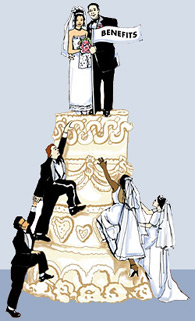The Pope's ambassador to Spain, one of Europe's leading Catholic countries, has for the first time spoke against the Catholic Church's official position on same-sex relationships being "evil and deviant." The Spanish government announced last month that it would legalise same-sex marriage.

The 66-year-old papal envoy departed from his prepared speech at a conference of Spanish bishops over the weekend. According to The Guardian citing reports in the Spanish press, Monteiro de Castro said: "The new political situation in which we are living in Spain sets new challenges in the spreading of the gospel and we must meet those challenges in an appropriate manner."
He added that although the law in Spain, and many other countries, defines marriage as the union of a man and a woman, "there are other forms of cohabitation and it is good that they be recognised."
Although he insisted that same-sex unions could not be regarded as marriages, the envoy implied that they were at least worthy of compassion.
"They are not the same as marriage," he said. "We will leave the term marriage for that which it has always referred to, and other arrangements should be given other names."
He added that gay couples should be accorded certain civil rights, including those within the social security system; and added that the "church can also help them in their spiritual life."
The unusually outspoken remarks were in sharp contrast to last year's Vatican guidelines which called on Catholics to campaign against the legalisation of gay relationships, calling them evil, deviant and a grave threat to society.
The document said: "There are absolutely no grounds for considering homosexual unions to be in any way similar or even remotely analogous to God's plan for marriage and family. Marriage is holy while homosexual acts go against the natural moral law.
"Legal recognition of homosexual unions or placing them on the same level as marriage would mean not only the approval of deviant behaviour... but would also obscure basic values which belong to the common inheritance of humanity."
The Archbishop of Madrid, Cardinal Antonio Marķa Rouco Varela, is reportedly not in agreement with granting gay couples legal rights.
He addressed the conference: "Marriage, as an institution, contributes to the growth and stability of society as a structure for bringing up children. For that, we owe it the recognition and legal support of the state.
"Homosexual cohabitation, which can never fulfil that role, cannot be credited with the same social function as marriage and the family."
The cardinal added: "This is not about denying anyone their rights, on the contrary it's about defending the rights of the family in a coherent fashion, and that is an issue of vital importance for the present and future of Spanish society."
He added that acceptance of homosexuality as equivalent to marriage was a "sad truth" about the declining importance of religious values in Spanish society.
The debate within the Catholic community mirrors the crisis in the worldwide Anglican communion, threatened with splits over the church's attitude to homosexuals, particularly those who are ordained.
